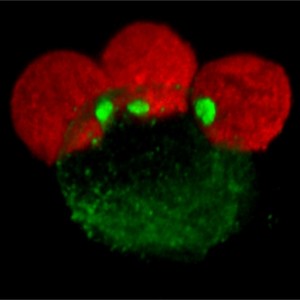
HIV Virological synapse between an infected Jurkat T cell (green) and three primary CD4+ T cells (red).
Our laboratory is interested in understanding virus host interactions that cause disease in humans. We focus on human immunodeficiency virus type 1 (HIV-1), which causes a chronic infection of the immune system, and for which there now effective treatments, but still no vaccine or cure. Much of our work has focused on how the virus exploits cell-cell interactions to facilitate its spread throughout the immune system. We study adhesive contacts that can form between infected and uninfected cells called virological synapses. We have conducted live confocal imaging studies that have documented how virus assembly is coordinated with the formation of virological synapses. We have also learned how infection through virological synapses can facilitate viral escape from neutralizing antibodies and also helps the virus to maintain a high level of genetic diversity. Our current studies are focusing on mechanisms of immune escape by cell-cell transmission, examining whether some people may have antibodies that are associated with spontaneous control of HIV, and trying to understand how the virus initiates inflammation during untreated and treated infection. A better understanding of the immune cell interactions and interactions of HIV infected cells with the immune system may help to develop new vaccine approaches or strategies to cure the infection.
